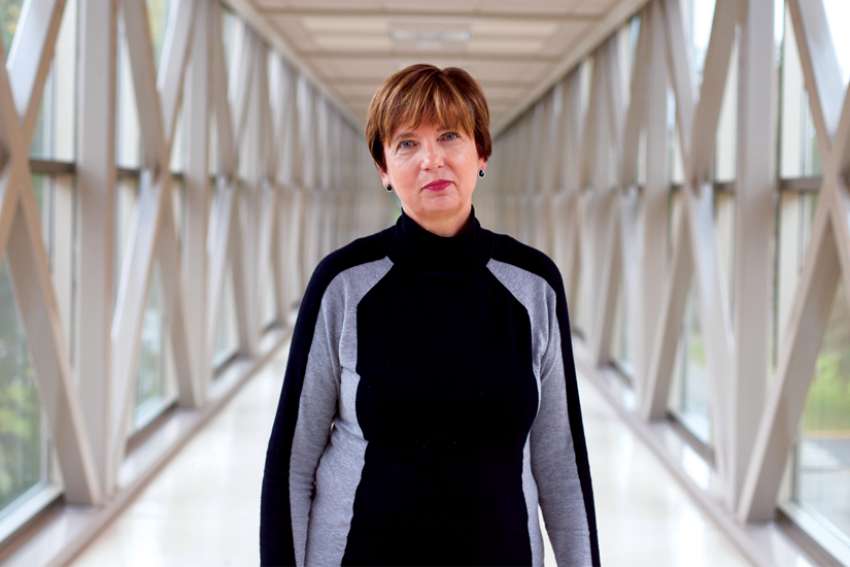Dr. Hilda Koster has just taken up a post as eco-theologian at Toronto’s St. Mike’s, where she will be expected not only to teach but to examine how theology is being studied across the institution — all through the eyes of Laudato Si’ and the broader movement in ecologically-focused theology.
“We are training leaders in the Church. We are helping them to translate and to bring the Gospel, the good news, to the people and to do that in ways that connect for people,” Koster told The Catholic Register from her home in St. Paul, Minn.
Though she’s in the full-time employ of the Basilian-founded Canadian university’s faculty of theology, COVID-19 has Koster stuck on the U.S. side of the border. She would love to be settling in Toronto, meeting her colleagues and students over lunch. But that isn’t possible for now. All of Koster’s courses and meetings will be held online, like those of her colleagues.
Though Koster comes in from Concordia College, a Lutheran institution in Minnesota, to fill a gap left by the 2019 retirement of Elliott Allen Institute director Dennis Patrick O’Hara, she will not be filling the vacant director’s chair at the institute. For now, she’s just teaching eco-theology from a feminist perspective while she helps the faculty of theology re-examine its work and mission through an ecological lens, said interim dean of theology John McLaughlin.
“The convergence of ecology and theology is more central to the life of the Church than it has ever been, with eco-theology inviting conversations across many disciplines — theology, Scripture, science, history, ethics, social sciences, art, liturgy and many more,” said McLaughlin in an e-mail.
Koster is well aware that conversations about ecology and feminism in academic circles are not translating into a common understanding, let alone enthusiasm, in the pews — especially among conservative Catholics who have equated eco-theology with pagan pantheism and feminism with an attack on the family undermining sexual morality. Serious academic theology has to do a better job of overcoming the fears that drive these populist, knee-jerk reactions, she said.
“Climate anxiety is a field of study,” she said. “What are the psychological obstacles that put them (climate deniers) against the science? What are the anxieties involved?”
Koster is certain that a better conversation about climate, ecology and faith begins with an understanding of grace.
“How we preach grace, preach God’s love, (that’s) how we can connect with these forms of willful ignorance and deep anxiety and fear,” she said. “The work that we are doing in the academy is to think about these things and to equip the leaders in the Church to address them better and more effectively.”
Koster’s most recent academic work is a book she edited with South African theologian Ernst M. Conradie called the T+T Clark Handbook of Christian Theology and Climate Change. This volume does something both rare and absolutely urgent in the field. It pairs the voices of thinkers from the rich, white, northern hemisphere — people who have benefited from industrialization and colonization — with theologians from the poor, Black, Asian and Indigenous southern hemisphere — those societies that now face the most severe consequences of climate change.
The feminist side of Koster’s work was also important to the hiring committee that eventually chose her, McLaughlin said. St. Michael’s was a pioneer when it became home to Fr. Steve Dunn’s Elliott Allen Institute for Theology and Ecology 30 years ago, long before most Catholic theology faculties were even thinking about ecology. But St. Mike’s also has a pioneering history in feminist theology as the home of the Sister of St. Joseph Dr. Ellen Leonard and Servant of the Immaculate Heart of Mary Sister Dr. Mary Ellen Sheehan.
“Dr. Koster’s fundamental emphasis on eco-feminism restores a central component of the faculty of theology’s long-standing contribution to the Church’s theological enterprise,” McLaughlin said.
A Dutch national with a Reformed Church background, Koster’s theological scholarship was formed under the influence of significant Catholic theologians at the University of Chicago, including the foremost scholar of Medieval mysticism Bernard McGinn, the late Sr. Anne Carr and Fr. David Tracy. But her biggest Catholic influence has been Pope Francis, thanks to Laudato Si’.
“Laudato Si’ has captured the moment of a broadening sense of urgency,” she said. “It’s not just for people who are environmentalists, or who are interested in environmental ethics, but basically everyone.”
“Dr. Koster’s knowledge of Catholicism, alongside other Christian traditions and world religions, will help her contribute to spreading the pontiff’s historic message about a fundamental issue of concern for the world today,” said McLaughlin.


